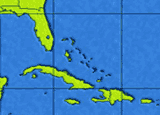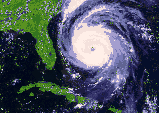|
Back to Florida Hurricane Main Page
Hurricane Preparations Safety - Part Two
Heatstroke
- The rain and wind of a hurricane may be followed by days of
hot and humid weather. It can be an almost unbearable adversary
if you do not take some steps to try and keep yourself cool.
Protect yourself from heat exhaustion and heatstroke, here's
what you can do to stay cool while rebuilding under the blazing
sun. Wear loose, light colored clothing and a hat. Dampen
yourself and your clothes as the water evaporates, your skin
will cool. Drink plenty of liquids and eat smaller, lighter
meals.
Avoid alcoholic drinks. They will raise your body temperature
and tend to dehydrate you. Always wear a strong sunscreen.
Pets and Animals
- Wild or stray domestic animals can
pose a danger during or after the passage of a hurricane.
Remember most animals are disoriented and displaced as well. Do
not corner an animal. If an animal must be removed, contact your
local animal control authorities. If any animal bites you, seek
immediate medical attention. If a snake bites you, first try to
accurately identify the type of snake so that, if poisonous, the
correct anti-venom can be administered. Do not cut the wound or
attempt to suck the venom out. Certain animals may carry rabies.
Although the virus is rare, care should be taken to avoid
contact with stray animals and rodents. Health departments can
provide information on the types of animals that carry rabies in
your area. Rats may also be a problem during and after a
hurricane. Take care to secure all food supplies, also remove
any animal carcasses in the vicinity by contacting your local
animal control authorities.
Chemical Hazards
-
Be aware of potential chemical hazards
you may encounter in the aftermath of a storm, especially if the
hurricane is accompanied by flooding. Floodwaters and high winds
may have moved or buried hazardous chemical containers of
solvents or other industrial chemicals. Contact your local fire
department about inspecting and removing hazardous chemical
containers. Avoid inhaling any chemical vapors. Never "sniff"
any container to see if you can identify the contents, one sniff
of some chemicals and kill you grave yard dead. If any propane
tanks (whether 20-lb. tanks from a gas grill or household
propane tanks) are discovered, do not attempt to move them
yourself. These represent a very real danger of fire or
explosion, and if any are found, the fire department, police, or
your State Fire Marshal's office should be contacted
immediately.
Car batteries
contain sulfuric acid, which is very
caustic. Removal of automotive batteries from your property can
be accomplished safely, but they should be removed with extreme
caution. It is best to use "chemical" gloves and other safety
equipment. Avoid coming in contact with any acid that may have
spilled from a damaged car battery. Use baking soda to
neutralize any acid spillage.
Tips after a Hurricane Do not examine your home
for damage with matches, candles, or other other "flame based"
lighting. Use flashlights.
Avoid downed power lines. If you stored water in open containers
such s bathtubs, do not drink without purifying first.
PREPARATIONS - HOME SAFETY Food, Water, Pets, Drowning etc.
Hurricane Evacuation Check List
Hurricane Preparations Safety Pt 1
Hurricane Preparations Safety Pt 2
Drinking Water Hurricane Pollution
How to Choose
a Generator
Protect From Flying Debris Wind
Damage
Rebuilding Homes Hurricane
Damage
Gulf Loop Florida Map
Florida Hurricane
Home Insurance
Biggest Waves
Hurricane Ivan
Back to Florida Hurricane Main Page |



